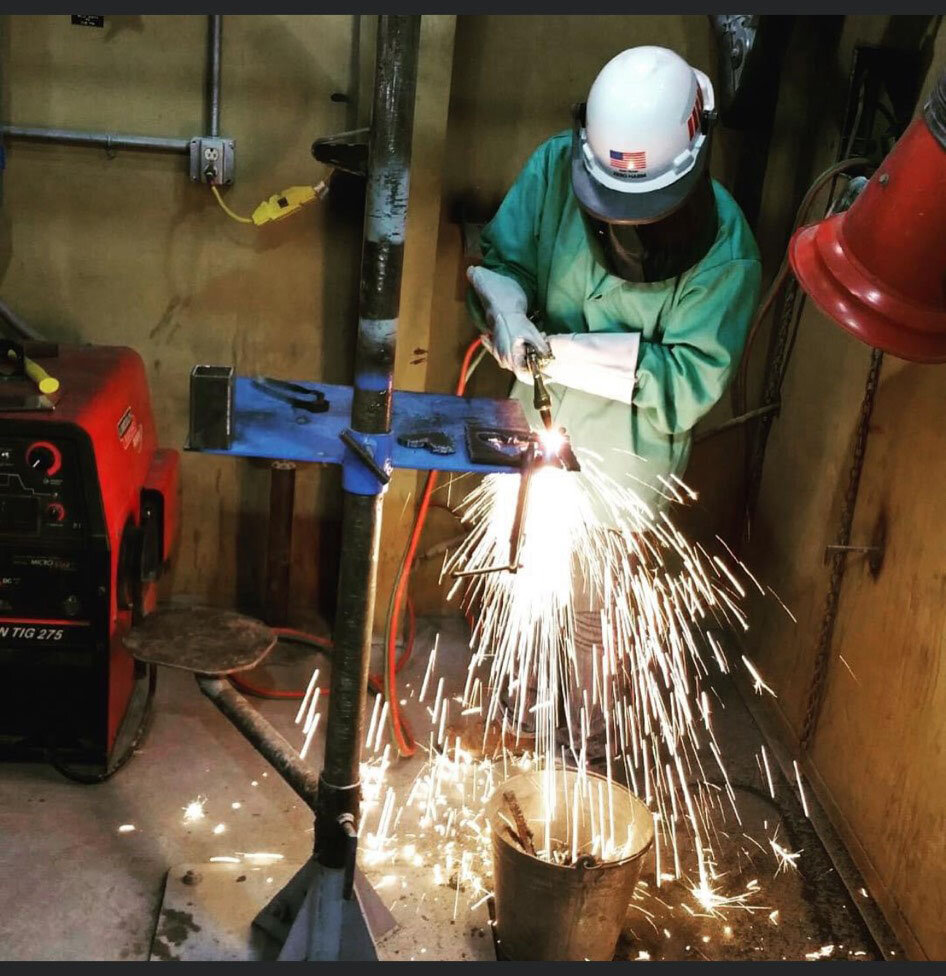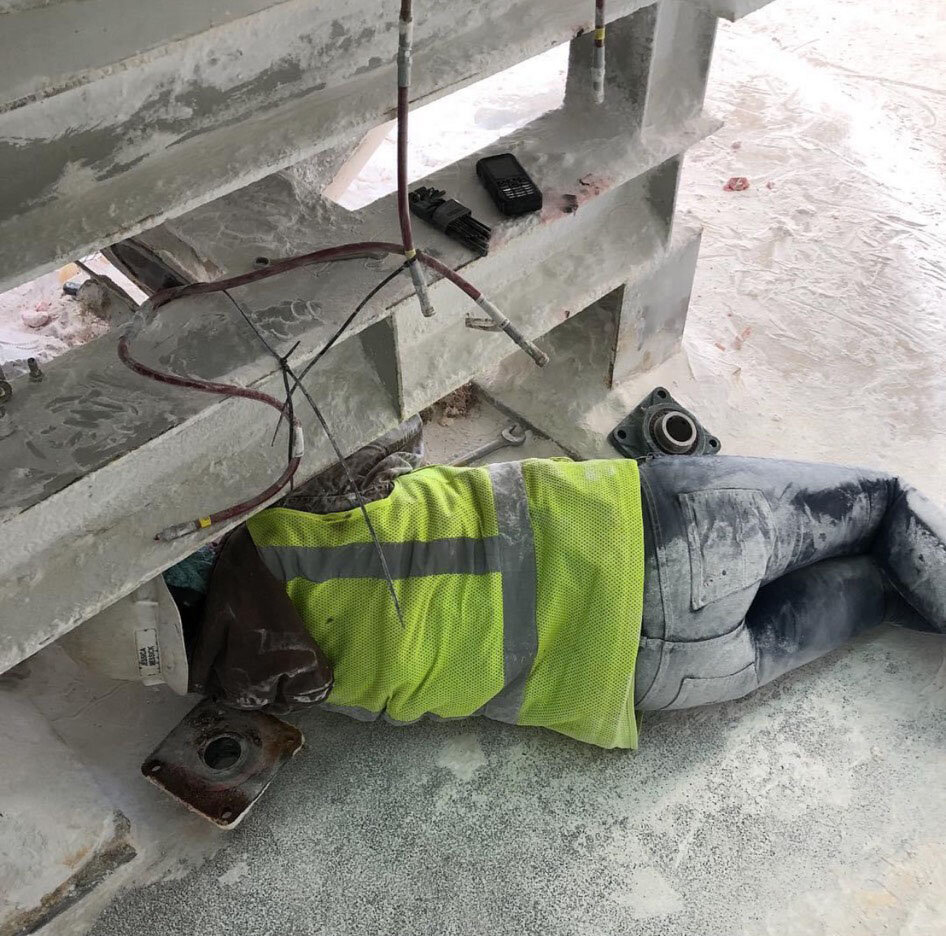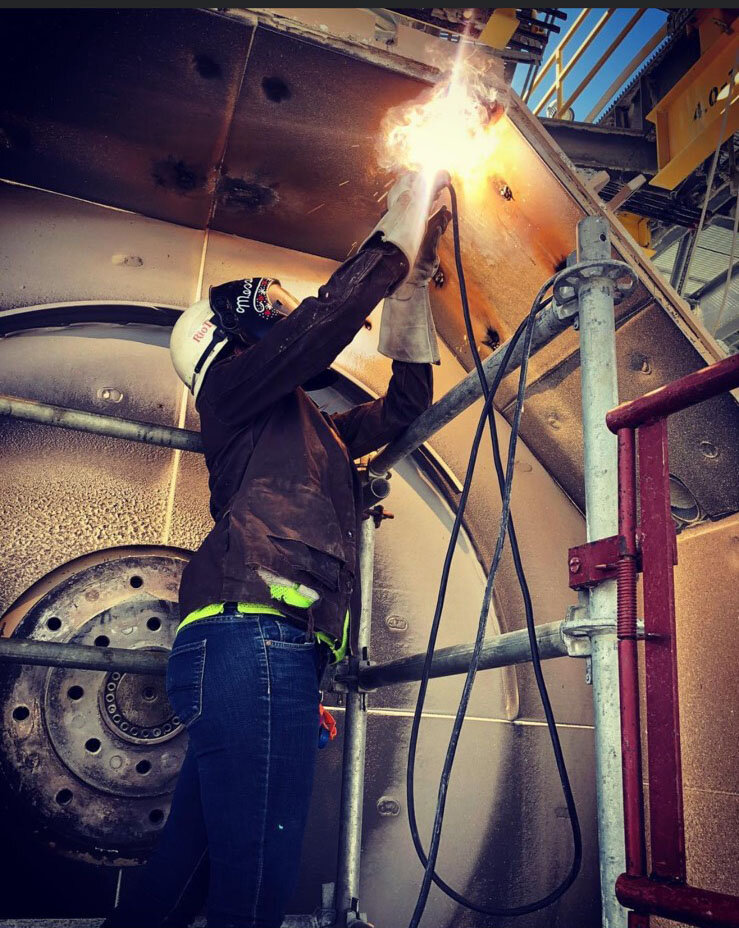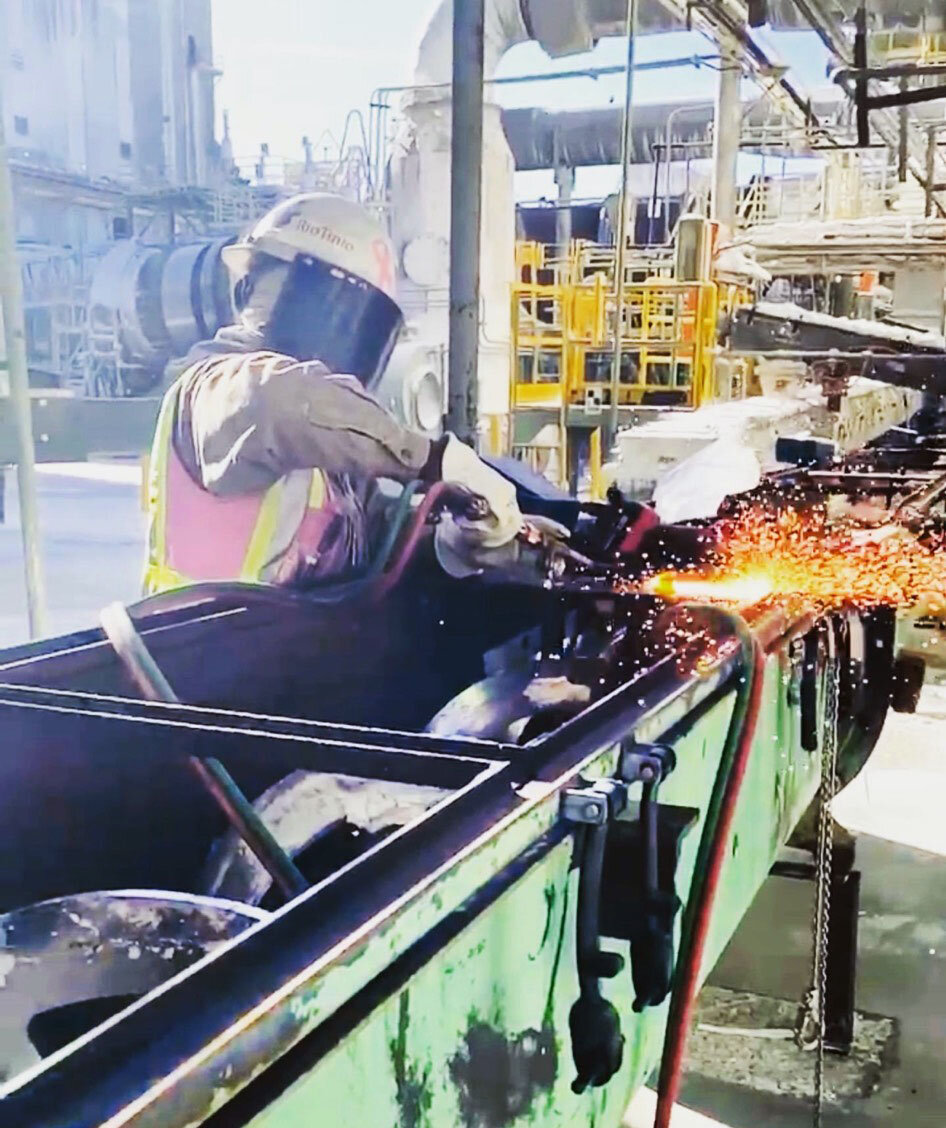Women Can Be Millwrights, Too! Meet U.S. Borax’s FIRST FEMALE FIRST CLASS MILLWRIGHT
THE FIRST AT U.S. BORAX
Working on rock crushers and conveyor belts at a mine might not be the job that every girl dreams of . . .. but to Jessica Messick it has been a dream come true. With a ton of hard work, a positive outlook, and years of training and certifications, she’s managed to make her dream come true and become the very first female First Class Millwright at U.S. Borax with Rio Tinto.
U.S. Borax (Rio Tinto) is located about 40 miles west of Barstow in Boron, California. U.S. Borax operates California’s largest open pit mine -- one of the richest borate deposits on the planet. While boron is present everywhere in the environment, substantial deposits of borates are relatively rare. Borates are used to produce numerous products from cleaners and detergents to batteries and capacitors to metals and gold. U.S. Borax supplies nearly half the world’s demand for refined borates, minerals essential to life and modern living. https://www.borax.com/borax-operations/boron-california
Jessica Messick, First Class Millwright
Jessica’s a Barstow native that attended both Barstow High School and Excelsior and graduated in 2008.
jessica’s STORY
A few years after high school graduation, Jessica started working for Rio Tinto at U.S. Borax, where she quickly decided she wanted to become the first female First Class Millwright. The journey wasn’t a walk in the park but her hard work and passion to work up the ladder and make history was too enticing to give up. Her story is completely compelling and one that will inspire you.
QUESTION: Jessica, would you describe what you do and how you got to your current position?
Jessica: In my position I maintain and repair most of the equipment and machines at the mine. There are so many processes that are done at the mine, and that means lots of machines and equipment to repair and maintain.
Some of the tasks that I do at work are welding, small fabrications, and installing pumps and gearboxes for heavy machinery. I diagnose and repair all types of rotating and conveying equipment, including bucket elevators, screw conveyors, belting, and materials handling. I work on centrifuge machines, rock crushers, and other large machinery. Another part of my job is to know how to move large equipment and things at the mines. This requires that I know how to give and receive crane signals and be able to calculate loads and rigging correctly. I work at heights which require climbing in a harness. I use JLG’s, man baskets, and scissor lifts, along with working off scaffolding. There are so many different types of equipment and machinery out there that always need repairs or some part replaced so my job never gets complacent or boring. There’s always something new to work on or learn.
I started out as a janitor and then applied for a Millwright Helper the second it came out. I was hesitant at first because there had never been a female to make it to First Class. And out there it is a pretty male dominant place. My dad is a First Class Millwright in the industry and with his help and guidance I applied and passed a math and aptitude test. I studied super hard and aced both of them ... not thinking I would. I went through a four year apprenticeship program called NCCER. Rio Tinto (U.S. Borax) paid for me and the other guys to go to school at work. Each week we spent two days in class and two days in the field training with a First Class millwright. We worked four 10 hour shifts each week. I will have to say that going through the program being the only female was challenging at times but I was doing what I loved and gained a bunch of respect for showing that I was dedicated and determined to keep up or even pass up some of the guys. Having my dad as a role model and a mentor really helped.
QUESTION: How many years have you worked for Rio Tinto?
A total of 8 years. I was a janitor my first two and half years, a Helper Millwright for two years, spent two years as a Second Class Millwright, and I’ve been a First Class Millwright for a little over a year.
QUESTION: What would you say is the best thing about working for your company?
Rio Tinto gives you lots of different varieties of jobs and careers. They are very focused on safety and quality. Pay is good and it's close to home. They offer lots of learning opportunities and they offer NCCER training and certifications for millwrights and electricians.
QUESTION: What types of certifications are required for your position?
You start as a Helper Millwright then move up to Second Class Millwright, and then on to First Class Millwright. A Helper does not really require much, just a standard math and aptitude test, but a background in maintenance or welding is always good to have. A Second Class Millwright has to pass both tests (math and aptitude) and pass a 3/8 plate test (weld two plates together and have them bent). A First Class Millwright has to pass both tests (math and aptitude) and then a 6g 6'' pipe test (weld two 6" pipes together and cut and bend them). For a Second and First Class you must have a background in welding and some pipe fitting, along with knowledge of industrial work and working around the different types of machinery and equipment a mine site has.
QUESTION: You mentioned that you were trained at Rio Tinto, what certifications/training did you earn on the job? Did the company pay for these?
The company paid for everything. I had a schedule of Monday thru Thursday from 6:00am to 4:30pm with two days in class and two days following and helping a First Class Millwright. Going through the four year program gave me a ton of certifications, like operating a forklift and a scissor lift, a JLG lift, and a bobcat. I also got trained on rigging loads for a crane and learning the different hand signals. I can inspect scaffolding and fall protection. I also have all my certificates for completing all the different books the NCCER requires you to have like aligning pumps and motors, welding, and blueprint reading. There are so many it's hard to name them all.
QUESTION: Did you take any high school/college courses to prepare you for your career?
I did not take any extra classes in school but I wish I had taken classes like welding and blueprint reading. Anything to do with maintenance would've helped a lot. If I had I could have started my career a lot sooner and made a lot more money faster.
QUESTION: Did you have any hobbies or interests outside of school that prepared you for your career?
My hobbies are spending time with my family (a fiancé and two kids). Ever since I was super little my family has always been into off-road racing. Being around and a part of that prepared me - I learned about hand tools, power tools, working on motors/engines, and some welding. These are all things that helped prepare me for what I do at work. I’m not one that’s afraid to ask questions on how something may work. I have always been open minded and willing to lend a hand. I’ve never been afraid to get greasy or get my hands dirty from working on or around the race cars. Also, I have always found it very intriguing how the mining industry works. I think it’s awesome how they can take a simple rock and turn it into a product that is in almost everything we use.
QUESTION: Taking all that you experienced with your career, what advice would you give high school students in order to prepare themselves for a career or just life after high school?
Stay focused on your goals. It helped that I had a role model to look up to and guide me in the right path (my dad). If there is something that you don't think you could do or achieve YOU CAN, it just takes dedication, hard work, and you have to be passionate about it. If I can do it anyone can!
QUESTION: What steps would someone take to find out about positions at U.S. Borax (Rio Tinto)? Any helpful advice on the process?
For someone looking to get hired on at Rio Tinto, the best place to go is indeed.com. Rio Tinto is always posting and pulling jobs off of that site so you almost have to check it daily. You can always start out at the bottom and work your way up like I did. It doesn’t take very long to move up out there. A Millwright really only requires you to pass a welding test and a simple math and aptitude test. There have been First Class Millwrights hired on that are very young. Experience is good to have. Millwrights are hard to find nowadays; even machinists are hard to find. Rio Tinto has a wide variety of jobs: welders, haul truck drivers, electricians, shipping department utility workers, laborers, plant operators, and a few others. You got to love what you do!
QUESTION: What are the coolest things about your job?
It’s fast paced and there’s always something new to learn and experience. I love what I do. I love a good challenge, and sometimes the jobs can be very challenging. I like the fact that I get to work with my dad. I love the atmosphere. I like making history and becoming the first female First Class Millwright! :)
QUESTION: If you could switch jobs with anyone else at your company, whose job would you want and why?
I love where I am now. I would not want to change my job. This is the job I wanted and strived for. I work my butt off and have proved that a woman can do the same thing a man can do.
Thank you, Jessica! Your enthusiasm and excitement for what you do is truly inspiring. We’re so proud of your accomplishments and are looking forward to learning about you mentoring and training up the next female First Class Millwright.
by Carrie O’Neal








